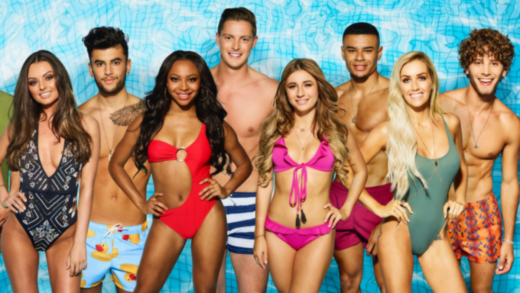The most popular American dating shows have always been rather chaste affairs, by comparison, drenching themselves in symbols of traditional romance in an attempt to steer clear of trashiness. Even Bachelor in Paradise—certainly the least uptight of the primetime looking-for-love shows—has a rose-based system to make all of the hooking up more palatable for viewers. Love Island offers no such niceties.
In the early stages of each season—and, please note, the last season was a whopping 57 episodes long—Love Island is about as close to Tinder-swiping as you can manage in real life. It is not a gentle show. People are initially separated up into couples via the medium of a bathing suit line-up. Some of the contestants get sent to a "subs bench" if no one chooses them. This process can be so brutal, it makes The Bachelor's rose ceremonies look like Sesame Street.
Even after the couples have paired off, the public can vote on who should go on dates with whom, and new men and women are brought into the house to shake things up all the time. Season 4, for example, started with 11 contestants and, by the end, had seen 38 people come and go. What this means is, partner-dumping happens repeatedly—sometimes to the same people over and over again. To make matters worse, all of the contestants sleep in the same room, couple-by-couple. This means that sometimes, someone who's just been swapped for someone new, then has to sleep alone next to a bed containing the person who just dumped them and their new partner.
Then there are the hosts. There couldn't be a greater contrast to the incredibly serious, dramatic tone of Chris Harrison on all of the Bachelor franchise shows. Love Island has a sarcastic voiceover that makes frequent cheeky jokes and actively makes fun of contestants. The host who shows up to handle "re-coupling" ceremonies and the finale is Caroline Flack—most famous on this side of the pond for dating Harry Styles when he was 17 and she was 31.
The reason Love Island gets away with all of this is because of how incredibly nice everyone on the show is to each other. On the women's side, there are no mean girls, no drama and no passive aggression—just women supporting other women and doing each other's hair. Similarly, for the men, there is no macho posturing and peacocking. They may put on brave faces and false bravado in front of the female contestants, but with each other, these dudes aren't afraid to talk about their feelings and comfort each other in times of woe. This supportive environment is basically the antithesis of American reality television. Over here, the more conflict, the better.
Sure, there are occasional blips and issues between contestants, but the couples all seem genuinely happy for each other when they find the right partners. By the end, one gets the sense that no one even particularly cares about winning the £50,000 prize; they're all just happy to be happy. American television hasn't produced a reality show with no villains since the first couple of seasons of The Real World. It's unlikely to start now.
Despite all of this, the end of each season of Love Island is tailor-made for U.S. TV. The final couples offer romantic declarations to one another as if they're taking vows, they take part in a mini prom, complete with a dance routine, and the public decides who the winning couple should be.
The non-sexual conversations in the house also line up with what America already likes about reality television: fluff. Even when there are super-smart contestants taking part (Season 4 had an ER doctor and a nuclear systems design engineer), there is almost nothing of substance spoken about in this show whatsoever. When a passing reference to Brexit recently occurred, one 21-year-old had no idea what it even was. She also thought the English town she lived in was "a continent." This kind of content might beg belief, but it also makes for the kind of absurdly entertaining TV that America has loved ever since Jessica Simpson's "Chicken of the Sea" moment.


